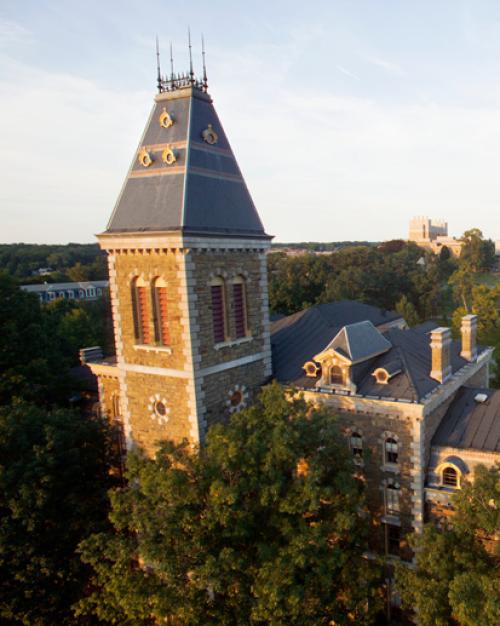Studies exploring the effects of disadvantaged neighborhoods, a reimagined school recess and customized avatars were among a slate of faculty projects receiving grants this fall from the Cornell Center for Social Sciences (CCSS).
In all, the center’s Fall 2019 Small Grant Awards supported 14 proposals, including nine research projects and five academic conferences, with a total of $90,000.
The awards provide seed funding to help early career social science faculty members develop ambitious projects likely to lead to external funding and publication.
“These grants fund cutting-edge research by social scientists across colleges,” said Sahara Byrne, CCSS co-director and associate professor of communication in the College of Agriculture and Life Sciences (CALS). “As a recipient of a CCSS grant in the past, the funds made all the difference, allowing me to collect pilot data for a project that led to a National Institutes of Health-funded grant.”
A CCSS grant will help Steven Alvarado, assistant professor of sociology in the College of Arts and Sciences (A&S), research “Multigenerational Neighborhood Effects,” a study of how successive generations of childhood exposure to disadvantaged neighborhoods affect the future well-being of adults and their children. “Inequality in life chances is often rooted in the opportunity structure of previous generations,” Alvarado notes.
Janet Loebach, assistant professor in the Department of Design and Environmental Analysis in the College of Human Ecology (CHE), will analyze a program that seeks to encourage more creative and self-directed play during recess by introducing “loose parts” – items such as tires, cardboard boxes and tubes, crates and sand. In “Reimagining Recess: Examining the Impacts of Schoolyard ‘Loose Parts Recess’ Programs on the Outdoor Play Behaviors of School Age Children,” Loebach will observe outdoor play, learning and social activities at two public elementary schools, one in Ithaca and one in Toronto.
Andrea Stevenson Won, assistant professor of communication in CALS, will investigate the potential for more realistic avatars that could enhance “a sense of embodiment” important to some medical and educational applications. “The Effects of Avatar Appearance and Customization on Embodied Applications” will advance understanding of what choices users want and how avatars affect various social science measures.
Additional research projects receiving small grants of up to $12,000 include:
- “What is the Advantage of Medicare Advantage? Supply and Demand Factors in Medicare Beneficiaries’ Enrollment in Private Insurance,” led by Colleen Carey, assistant professor of policy analysis and management (CHE).
- “Returns to Mechanization through Rental Equipment Markets,” led by Julieta Caunedo, assistant professor of economics (A&S).
- “Community Needs Assessment on Facilitators and Inhibitors of Food Security in Toa Alta, Puerto Rico,” led by Roger Figueroa, Provost New Faculty Fellow in the Division of Nutritional Sciences (CHE); and Reah Chiong, a doctoral student in the field of nutritional sciences.
- “Sub-Saharan African Migration Project (S-SMAP) (African Futures Project)” by Tristan Ivory, assistant professor of international and comparative labor (ILR School).
- “The Take-Off of the Korean Wave: Antecedents and Consequences of the Globalization of Korean Pop Culture,” led by Heeyon Kim, assistant professor of strategy in strategy in the School of Hotel Administration (Cornell SC Johnson College of Business).
- “The Capacity to be Aggressive: Structured Management and Tax Behavior or Firms,” led by Daniela Scur, assistant professor of strategy in the Charles H. Dyson School of Applied Economics and Management (SC Johnson College).
The five conferences receiving grants of up to $5,000, planned for the spring of 2020, include:
- “The Moral Psychology of Public Life,” an interdisciplinary conference exploring connections between moral psychology and contemporary social issues, organized by John Doris, the Peter L. Dyson Professor of Ethics in Organizations and Life at the Charles H. Dyson School of Applied Economics and Management (SC Johnson College) and professor in the Sage School of Philosophy (A&S); Laura Niemi, visiting faculty in the Department of Psychology (A&S); and Shaun Nichols, professor of philosophy (A&S).
- “Democratic Representation: Acts, Aesthetics, Institutions,” a meeting of the International Conference for the Study of Political Thought, organized by Jason Frank and Jill Frank, professors of government (A&S).
- “Whose America? U.S. Immigration Policy since 1986,” a one-day conference examining the impact of post-1980 U.S. immigration laws and policies, led by Maria Cristina Garcia, the Howard A. Newman Professor of American Studies in the Department of History (A&S).
- The 30th annual Semantics and Linguistic Theory (SALT 30) conference, which studies meaning in natural language, organized by Sarah Murray and William Starr, associate professors of linguistics and philosophy, respectively (A&S).
- “Social Science Symposium on Climate Change,” a two-day meeting in California probing “how insights from the social and behavioral sciences can inform climate change communication, advocacy and public policy,” organized by Jonathon Schuldt, associate professor of communication (CALS).
This article also appeared in the Cornell Chronicle.




